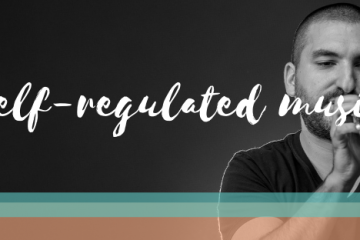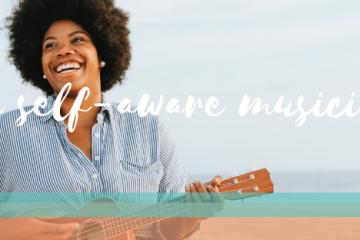Your show starts in 5 minutes. You’ve seen the audience arriving at the venue, including friends and family, eager to see you perform.
You should be feeling confident and ready because you’ve practiced so much, but your body has other ideas… Your heart is pounding, you have butterflies in your stomach, your hands start to shake and your mind is racing with thoughts of everything that could go wrong.
Everything you’ve learnt has disappeared and you doubt your ability to play anything at all once you get on stage. Does any of this sound familiar? If so, you’ve probably experienced what is commonly known as stage fright.
You’re not alone.
Most musicians would admit to suffering with stage fright at some point in their musical career. In one study, 96% of orchestra musicians admitted to feeling anxious before a performance. Adele, Van Halen, Rhianna and Luciano Pavarotti are just a few examples of very famous musicians that struggle with their nerves when they perform.
I’ve also suffered with severe, sometimes debilitating bouts of stage fright.
I remember the first time I sang at Glastonbury festival, in 2008. As soon as I stepped onto the Glade stage to a crowd of thousands, I started to shake. My knees were literally knocking, which up until that point I thought was just an idiom. All I could think about was whether everyone could see me shaking. It was so distracting, that even though I enjoyed the show, I can’t remember how I performed. It seems that my mind has chalked it up to a traumatic experience… One that I shouldn’t have to relive.
Another time, when I was around 17 years old, I auditioned for a new girl band with my eyes tightly shut. I was so terrified, I just couldn’t face opening them! Needless to say, I didn’t get the job.
Fight or flight
When you experience stressful situations or threats, hormones are released into your bloodstream. These hormones set off a chain of reactions that mobilise your mind and body to either fight or flee the threat… The primary function is to keep you alive and safe.
How do you know you’re in fight or flight mode?
- Shaking (tense muscles are ready to spring into action)
- Sweating (regulates body temperature to keep you cool)
- Focus on worst case scenario (prepared for the worst, ready to respond)
- Increased heart rate (oxygen fuels a speedy response to threats)
- Brain working overtime (calculating chances of success)
- Flushed (or pale) skin (blood moving to the best place to work muscles and essential organs)
What does this have to do with stage fright?
The fight or flight response is not only triggered by physical threats… Even when you’re physically safe, psychological challenges (such as performing to an audience) can generate this hormonal response in your body.
Stage fright appears when your brain decides that the chance of failure is higher than the chance of success in your upcoming performance… If your brain calculates that you’ll succeed, you won’t feel so many nerves.
Can you stop this fight or flight response?
No, and you wouldn’t want to. The fight or flight response is essential to keep you safe and alive in your environment. When you walk down a dark, abandoned street late at night, you’ll feel nervous for good reason… Your body is ensuring that you’re alert and ready to deal with any potential danger.
You can, however, become aware of how you experience stage fright. You can understand what causes you to become nervous and appreciate the additional focus and energy a little bit of stage fright gives you.
10 practical tips for conquering stage fright
-
Nerves are your friend.
It’s great that you’re feeling nervous, as this means you’re alive – a real human being! Your body is protecting you (fight or flight) and we can experience many benefits from feeling nervous. Your senses become sharper, you’re more alert and it’s exhilarating. This is really useful for a good performance – particularly when you’re live on stage, as you need to adapt to everything that happens in the moment e.g. sound challenges, forgetting lyrics, reacting to a brand new audience.
So embrace your nerves, appreciate them for keeping you alive and alert, and learn to view them as having a positive influence on your performance.
-
Work the setlist.
If you have control of the set list, then give yourself a break and don’t start with songs that are difficult to play… Kick off the show by playing some of your easier material – the songs you know that you’ll perform brilliantly. That’ll give you a boost of confidence when you get your all-important first round of applause.
-
Get the basics right.
Check that your equipment is working well and sounding good before you get to the venue. It’s also essential that can hear yourself properly and the sound quality in the venue is good, so always do a sound check before the audience arrives.
-
Reflect and recall.
REFLECT: Dedicate time after each performance to reflect on not only what didn’t go well (that’s probably where you naturally focus your attention), but what did go well. What made you feel good? What did the audience positively react to? What went well? And then… What didn’t go so well and what improvements are needed?
RECALL: Take some time before every gig to recall the feeling of success you’ve experienced from previous performances… When the crowd cheered, when you nailed that tricky guitar part, or when you expertly sang the lyrics that took you six months to learn. Just enjoy the feeling, bask in it, and allow yourself to believe that there’s more of that to come.
-
Perfect practice.
It goes without saying that an essential element of conquering nerves and building confidence is to know your material inside and out. In American football, ‘perfect play’ is a term used when the team is analysed by coaches as they slowly run through play after play. They have to put together multiple plays, perfectly, to finish the drill. If any of the 11 players make a mistake (quite likely with a large group), the whole squad starts again from the beginning.
Practicing in this way means when the team are physically and/or emotionally drained at the end of a game, they can still run these plays perfectly. Muscle memory takes over and even if their conscious mind has checked out, they continue to give their best performance. How perfect are your practice sessions?
-
Hello Wembley!
Always perform like you’re on stage – even at home. This will help you to feel some of those nerves in a more comfortable environment. E.g. when the pressure is on to finish a song you just messed up, you can work on your ability to manage your emotional reactions and adapt in the moment.
If you find it difficult to get into the vibe of a full live performance in your living room (who could blame you) then get some people to join you… A few friends or family members will help to replicate the feel of a live performance in the comfort of your home or rehearsal studio.
-
Breathe.
When you feel stressed, you may breathe less or hold your breath. This means less valuable oxygen in the body, when you really need more to manage fight or flight reactions.Take time to breathe before you go on stage, it’ll relax you and bring you into the moment. It’s simple: take a long, slow breath in through your nose, filling your lungs from the bottom to the top. Hold your breath to the count of “three.” Exhale slowly through your mouth, and relax the muscles in your face, jaw, shoulders, and stomach. Repeat.
There are subtle ways to take a deep breath mid performance if you need to relax… E.g. tuning your guitar, checking the set list or having a drink of water all provide great opportunities for taking a long deep breath!
-
Know your process.
Think of some activities that used to make you nervous, but seem natural now e.g. driving a car or learning a sport. When you first tried that activity, you probably felt nervous, made the occasional mistake and took time to ease into it and feel comfortable. And now, before you drive your car somewhere new or play that sport, you may still feel nervous, but you have a different association to those nerves… You can control them now. So what helped you to control those nerves? How did you build confidence? Was it practice? Making mistakes? Feedback?
When you work out what your path to success was, you’ll have a tried and tested process that has worked for you previously. Apply this to performing on stage and you’ll start to see rapid progress in controlling your stage fright.
-
Connect with your audience.
Smile, talk, make eye contact and use the nervous energy you feel to enhance your performance. The audience are friends, not enemies, and they’re there to support you.
Have you ever gone to performance as an audience member thinking about how the musicians are feeling / preparing / worrying? Probably not! As audience members, we’re normally too consumed with what’s happening in our own world to really think about the musicians we’re going to see… We just expect to enjoy the performance and appreciate the musicians for doing a great job. Remember, your audience want you to do well; they’re on your side.
-
Drop the need for perfection.
Being a great performer is not about playing or singing perfect notes every time… It’s about connecting and making people really ‘feel’ something for a moment. Music is art, and art is subjective so as a musician you need to accept you’ll never please everyone… Including you. But if you can create a space where people feel connected and inspired even for a short period of time, you’ve achieved something amazing.
Raw, authentic imperfection is the reason a lot of us choose to see live music rather than listening to the same music at home. Some of the most beautiful moments in performance happen when something goes wrong, because then the audience connect with you… You’re all on a journey together and no one knows the destination. How exciting! So give yourself a break… Actively notice and embrace the imperfection you see (in you, and others), and only set reasonable expectations for yourself.
What’s your top tip for staying calm on stage and conquering stage fright? Share your thoughts with us in the comments section below.
If you’ve enjoyed this article, then please share it using our social media icons. Remember you can grab a chat with us at any time – please get in touch.



